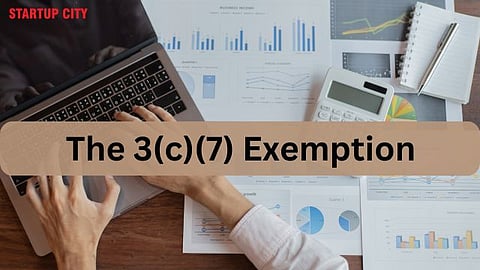

Navigating the realm of investment can be complex, with the array of regulations and exemptions governing diverse types of funds. Among these exemptions lies the 3(c)(7) exemption, a provision established within the Investment Company Act of 1940.
This article aims to explore the intricacies of the 3(c)(7) exemption, including its origins, how it works, and its pivotal role within private investment circles.
The 3(c)(7) exemption, often referred to as 3C7, is a clause within the Investment Company Act of 1940. It grants private investment companies relief from certain Securities and Exchange Commission (SEC) regulations, provided upon meeting particular qualifications.
Essentially, this provision enables these private funds to function without being bound by the rigorous regulatory standards imposed on publicly traded funds.
Originating within the Investment Company Act of 1940, the 3(c)(7) exemption was initially designed to delineate and oversee investment companies.
Nevertheless, hedge funds, venture capital funds, and other private equity entities pursued exemptions such as 3C7 to sidestep SEC limitations. This exemption empowered these funds to employ financial tools like leverage and derivatives, typically restricted for publicly traded funds.
Securing the 3C7 exemption requires private investment firms to showcase their commitment to abstain from initiating an initial public offering (IPO) and ensure that their investors meet the criteria of qualified purchasers.
These qualified purchasers encompass individuals, family-owned enterprises, trusts, or entities meeting stringent wealth thresholds, thereby upholding a heightened level of investment integrity.
Qualified purchasers encompass individuals or family-owned enterprises holding at least $5 million in investments, trusts overseen by qualified purchasers, individuals or entities possessing at least $25,000,000 in investments, and entities exclusively owned by qualified purchasers.
Despite both benefiting from exemptions under the Investment Company Act of 1940, 3C7 and 3C1 funds vary in their investor qualifications. 3C7 funds necessitate qualified purchasers, whereas 3C1 funds involve accredited investors.
While the former imposes no restrictions on the number of investors but requires a higher wealth threshold, the latter is limited to 100 investors but with less rigorous wealth criteria.
Ensuring adherence to 3C7 regulations is essential for funds utilising this exemption. Any deviation, such as accepting investments from non-qualified purchasers, may lead to SEC enforcement actions, litigation, and breaches of investor contracts, underscoring the importance of compliance.
Investment vehicles such as charitable organisations, pension plans, and church plans are not classified as "investment companies" under the Investment Company Act, thereby exempting them from its regulatory framework.
Accredited investors typically have to meet defined income and net worth thresholds to invest in various financial instruments, such as securities or real estate. Financial institutions assess potential investors to verify their accredited status.
Conversely, qualified purchasers are identified not by income or net worth but by the size of their investment portfolio.
Qualified purchasers must meet more rigorous criteria, ensuring that funds with a restricted number of private equity investors can participate in the acquisition and disposition of public assets.
In conclusion, the 3(c)(7) exemption plays a critical role in enabling private investment companies to meet regulatory standards and attract qualified purchasers.
A comprehensive grasp of its background, criteria, and implications is essential for investors and fund managers in the private investment sector.
By adhering to prescribed regulations and upholding transparency, these funds can effectively utilise the advantages offered by the 3C7 exemption while mitigating regulatory challenges.